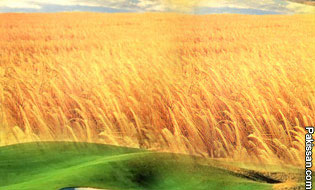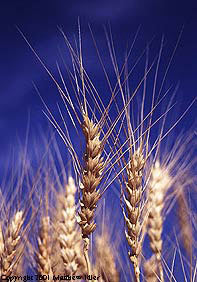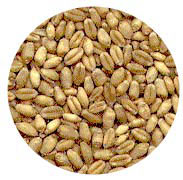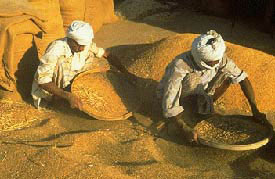|
Whither is Wheat?
Syed Shahid Husain
According to a report the government has finally decided to
import one million tonnes of wheat. Flip-flop on the part of
the government does not reflect well on the quality of
decision-making. Each passing day reinforces an impression of
a confused government completely confounded. It has been left
to the Ministry of Food and Agriculture to choose between
Trading Corporation of Pakistan (TCP) or Pakistan Agriculture
and Seed supply Corporation (PASSCO) as one of the two
agencies to organize the imports. The latter caused a near
fiasco in its last aborted attempt involving imports of
Australian wheat. The TCP should perhaps have been the natural
choice for having had the necessary expertise.
 This
would perhaps be the first time that wheat is being imported
in summer while the crop has just about been harvested. This
is normally the time of plenty coinciding with falling prices.
It is another matter that the government agencies involved
with this vital item of daily use of every Pakistani bungled
up the entire trading process by derailing normal private
trading and thus raised the prices to phenomenal level. This
would perhaps be the first time that wheat is being imported
in summer while the crop has just about been harvested. This
is normally the time of plenty coinciding with falling prices.
It is another matter that the government agencies involved
with this vital item of daily use of every Pakistani bungled
up the entire trading process by derailing normal private
trading and thus raised the prices to phenomenal level.
The private sector will take years to recover from the harm.
Had the government policy made any sense prices would be lower
and wheat abundant. It is, therefore, proof enough if one is
needed of a failed policy, which with persistence will not
transform itself into a success story.
With each passing day the wheat situation gets murkier. The
Government anticipated a less than optimum crop and decided to
import wheat, arrival of which was to coincide with the
wheat-harvesting season. Normally import months are November
to January. It was in February that the ships from Australia
arrived but the Government decided not to accept the goods for
being less than of the specified quality.
There was a suspicion that the Government had by now revised
its estimate of the expected crop upwards and therefore was
looking for an excuse to abort the imports. The same
shiploads, which were not according to our specifications,
were accepted in UAE.
The entire period from March to May has seen a consuming
crisis take a firm hold. It is an irony that at the harvesting
time when the prices usually drop and the Government is only
required to guard against an oversupply when every grower
wishes to sell his produce in the market and stem a fall by
rushing to provide safety net to the growers through support
prices. Against a support price of Rs.350/40 kgs, wheat is
available, if at all at Rs.400-450/40. K.gs.
The year 2000 saw a bumper crop of wheat and some well-heeled
functionaries of the government gave themselves the credit for
their enlightened approach for the outcome having increased
the support price that year to Rs. 300. Why has the outcome
been different this year in spite of a hefty increase this
year?
The Government has “discovered” the cause of the crisis to be
due to “hoarding”. And it has responded to the problem in the
market by ordering administrative measures, like raids on
wheat loaded vehicles, go downs and imposition of ban on
movement of the commodity from district to district or from
Punjab to other provinces.
But this has only compounded the crisis. The latest decision
to import has had a healthy effect on prices, which are
reported to have fallen by Re.1 per k.g.
 What
has actually happened no body knows. The estimates of wheat
crop have varied between 19 and 21 million tonnes. With a
carry over of two million tonnes even the lower end of the
estimate should suffice for domestic consumption without need
for imports, according to the consumption requirements of the
populace. The crisis appears to be man made and has been
caused mainly by the government. What
has actually happened no body knows. The estimates of wheat
crop have varied between 19 and 21 million tonnes. With a
carry over of two million tonnes even the lower end of the
estimate should suffice for domestic consumption without need
for imports, according to the consumption requirements of the
populace. The crisis appears to be man made and has been
caused mainly by the government.
Its misplaced policy of fixing a procurement target and
adopting draconian measures in trying to achieve it, because
growers did not want to sell at Rs.350/-, which is a base
price, when higher prices prevail in the open market, misses
the point. The Punjab, which is the largest surplus producer
of wheat, is in the forefront for the blame. It has resorted
to colonial methods of imposing restrictions on movement of
wheat from one district to another and particularly from
Punjab to other provinces, as if Punjab is a country within a
country. The ban has thrown the wheat trade in a spin. Hence
the crisis. Hoarding is the result of these abominable
measures.
Had the prognosis been right, these methods would have yielded
the desired results. Punjab is far from meeting its
procurement target. It has only succeeded in pushing the wheat
into the go downs of the hoarders and pushed the prices up -
both eventualities it wanted to avert with its misguided and
misconceived policies. It has robbed the grower of his due
share of his reward the market price offers him, which would
have ranged between Rs.350 to 400 had the ban on movement not
been imposed. The consumer would have been better off at that
affordable price.
The government of Punjab has hurt the consumer, the grower as
well as the trader. The flourmills are constrained in their
operation for want of supply of wheat from the go downs either
of the government, which wont issue them the quota precisely
when it is needed or of the private traders, who have
reportedly hoarded it. The flourmills are in a state of panic
and most of them are closed. Government stocks are intended to
allow it to overcome shortages by being a swing player by
releasing stocks when the private trader is trying to indulge
in profiteering, and by withholding them when there is glut.
 A
recent report in a leading English paper ascribes the crisis
to an exaggerated estimate of the wheat crop at 16 million
tonnes in Punjab, which according to a former Federal
Agriculture Secretary, Dr. Zafar Altaf is no more than 13
million tonnes. Where did he get these figures the report
would not say? According to him hoarding is not the cause of
the problem but it is the low output. Both causes appear to be
a misreading of the situation. A
recent report in a leading English paper ascribes the crisis
to an exaggerated estimate of the wheat crop at 16 million
tonnes in Punjab, which according to a former Federal
Agriculture Secretary, Dr. Zafar Altaf is no more than 13
million tonnes. Where did he get these figures the report
would not say? According to him hoarding is not the cause of
the problem but it is the low output. Both causes appear to be
a misreading of the situation.
The official estimates for the crop are of 20 million tonnes
of which Punjab has produced 15.9 million tonnes. Pakistan is
headed for serious wheat shortage in the coming months
according to him. The scribe of that news goes on to say that
unprecedented bumper crop of 21 million tonnes of wheat during
the year 2000 was due to Mr. Altaf. His report ends with a
gloomy forecast that the present wheat problem is on account
of failure on the part of his successors to provide necessary
interventions ‘in its different regimes including
intercropping of wheat with rice and cotton’.
Whether the scribe got carried away with glib claims of the
former Secretary or arrived at the results through an
independent analysis is not known. But the facts must speak
for themselves. The former Secretary has been dealing with
agriculture right since 1985 when he was Provincial Secretary
in Punjab. If he wishes to claim credit for the unprecedented
wheat crop in 2000 he must share the blame for poor
performance in the preceding years.
Even in the year 2000 the harvest of 21 million tonnes
reflected an increase in production in Sindh and Punjab but a
fall in the other two provinces. Does it mean that the
formidable Secretary was incharge of only half the country? He
was Federal Secretary for Agriculture thrice between 1993 to
1996 and 1998 to 2000 and Chairman Pakistan Agricultural and
Research Council twice. The years 1998-99 saw a decline in the
production of wheat and so did the year 1993-94.
 That
is not to say that he was not contributing his bit to the
improvement in agriculture. But that is only to underline the
arrogance and the hubris on the part of the former Secretary
to claim complete credit for a good crop in 2000. That
is not to say that he was not contributing his bit to the
improvement in agriculture. But that is only to underline the
arrogance and the hubris on the part of the former Secretary
to claim complete credit for a good crop in 2000.
A mini survey by Agriculture Prices Commission had determined
that the causes of wind fall were fortuitous event and owed
mainly to weather conditions and to the exertions of the
former Chief Minister, Punjab Mr. Shahbaz Sharif who had
ensured good governance extending to the Agriculture Sector as
well and involved timely availability of pesticides, seeds,
etc..
sshusain@hotmail.com
|
Pakissan.com;
|